Continual Professional Development
18th September 2023
Four Reasons why Continual Professional Development is Essential for the Modern Teacher
Continual Professional Development (CPD) among teachers is often viewed as a box-ticking exercise, associated with observation processes and performance management. It's no wonder why teaching professionals shy away from it.
But what if I told you that the impact of CPD on students and the school environment is phenomenal? According to research conducted by the Education Policy Institute, quality CPD has a bigger effect on pupil attainment than other interventions like performance-related pay for teachers or lengthening the school day. The DfE Standard for Teachers’ Professional Development also backs this up, explaining that 'effective professional development for teachers is a core part of securing effective teaching'.
Whether you're a primary school teacher, a university lecturer, a secondary school headteacher, or a learning support assistant, regularly updating your knowledge and skills with CPD can help you remain competent, effective, and innovative within your role.
If that has not already convinced you to invest your time in continual professional development, here are four more reasons why CPD is essential for the modern teacher.
1.You, the Students and the School – Everybody Wins.
CPD allows teachers, no matter their experience level, to enhance their skills and discover strategies for helping pupils. Oftentimes, CPD can increase a teacher’s motivation, confidence, and commitment to teaching. These attributes translate into the classroom and can increase engagement within lessons, helping students develop deeper knowledge and transferable skills. Therefore, enhancing the quality of discussions, influencing changes in behaviour, and increasing self-belief and confidence.
Don't just take our word for it; according to research by the Education Policy Institute, CPD makes a bigger difference to student attainment than lengthening the school day or introducing performance-related pay for teachers.
While empowering your students and creating an engaging classroom experience is crucial to your role, CPD has also been proven to increase staff retention and create an enjoyable workplace. Responses to a YouGov survey found that 74% of leaders consider teacher development to be important for school improvement purposes.
If you’re contemplating ways to help yourself and your students, have a look at these books on wellbeing:
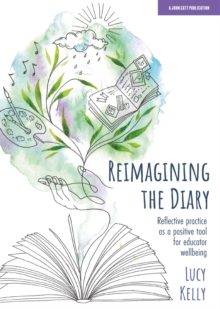
Reimagining the Diary: Reflective practice as a positive tool for educator wellbeing
Kelly, Lucy
Paperback / softback
If you're in education, then you know that while there are many positives to the profession, it is also facing many challenges. This easy-to-use, accessible, and entertaining book shows us how diary-keeping can help us gain insight into our wellbeing needs and move forward in our lives, personally and professionally. This book is the perfect starting point to explore what reflective practice means to you. From an overview of diary-keeping and why it's important for educator wellbeing, to plenty of practical tips, strategies, and activities for you to try out yourself, it is filled with simple pragmatic guidance to help make diary-keeping a sustainable part of your practice. Reimagining the diary - to include writing, drawing, audio recordings, photographs, scrapbooking, and other approaches - is not only fun and creative, but essential when it comes to understanding yourself and your own complex needs. By adopting small changes in a way that suits you, you can start to address your individual wellbeing needs and rebalance your work and, more importantly, your life.
More Details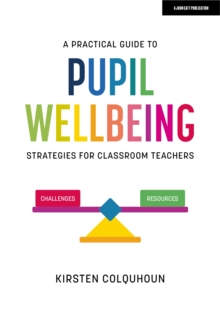
A Practical Guide to Pupil Wellbeing: Strategies for classroom teachers
Colquhoun, Kirsten
Paperback / softback
Every year thousands of research papers, guidance documents and educational aims are published on pupil mental health and wellbeing. Many of them offer insightful ideas and theories, but what is often lacking is a clear route for busy classroom teachers to apply these findings. A focus on wellbeing is here to stay, but what does it mean? How does it apply to the curriculum? And what is a teacher's role? This book critically explores the importance of being a research-informed teacher, assesses some of the key health and wellbeing areas that class teachers can directly affect, and offers practical advice on how to do this. Designed in part to create a clearer pathway for classroom teachers to ensure that, while already spinning their many existing plates, the health and wellbeing needs of their pupils can be met effectively. Teaching, like healthcare, has infinite capabilities to contribute to social improvement both for the individual and wider society. Teachers go above and beyond their job description every single day and face a myriad of challenges in doing so. This book will help to arm class teachers with a toolkit of information to help them succeed as teachers of health and wellbeing.
More Details2. Stay up to date.
Student needs (educationally and pastorally), teaching methods, and the wider world are constantly changing. So, it only makes sense that your skills and knowledge should adapt too. In a post-pandemic world, technology has evolved tenfold, there’s no better proof of that than the common day-to-day use of AI. As a result, the skills students will need in their careers and adult lives are unlike what they were five years ago, or even one year ago.
If you’re looking to start updating your knowledge have a look at the Teaching WalkThrus Series:
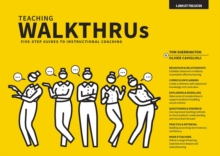
Teaching Walkthrus
Sherrington, Tom
Paperback / softback
Tom Sherrington and Oliver Caviglioli team up to present 50 essential teaching techniques, each with five clear and concise illustrations and explanations. It forms a truly unique repository of key teaching methods, valuable to any classroom practitioner in any setting.The book covers important practical techniques in behaviour and relationships; curriculum planning; explaining and modelling; questioning and feedback; practice and retrieval; and Mode B teaching. Each technique is simply explained and beautifully illustrated in five short steps, to make sense of complex ideas and support student learning.
More Details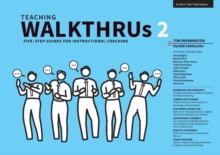
Teaching WalkThrus 2: Five-step guides to instructional coaching
Sherrington, Tom
Paperback / softback
In the groundbreaking and best-selling Teaching WalkThrus Volume 1, Tom Sherrington and Oliver Caviglioli produced a brilliantly concise and accessible repository to 50 essential teaching techniques. In this follow-up second volume, Tom and Oliver team up with 10 experienced educators to present 50 brand new WalkThrus, covering all the key areas of teaching: behaviour and relationships; curriculum planning; explaining and modelling; questioning and feedback; practice and retrieval; and Mode B teaching. Alex Quigley, Martin Robinson, Claire Stoneman, Bennie Kara, Zoe Enser, Mark Enser, John Tomsett, Simon Breakspear, Bronwyn Ryie Jones and Oliver Lovell bring a huge wealth of expertise as they help to further expand and elaborate this essential teaching manual. As always, each technique is concisely explained and beautifully illustrated in five short steps, to make sense of complex ideas and support student learning.
More Details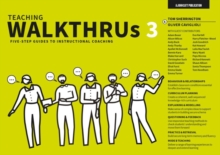
Teaching WalkThrus 3: Five-step guides to instructional coaching
Sherrington, Tom
Paperback / softback
Following the break-out success of Teaching WalkThrus Volume 1 (2020) and Volume 2 (2021), Tom Sherrington and Oliver Caviglioli present the third instalment of their five-step instructional coaching techniques. Volume 3 features 50 more essential teaching methods in the authors’ concise and accessible format, covering all the key areas of teaching: behaviour and relationships; curriculum planning; explaining and modelling; questioning and feedback; practice and retrieval; and Mode B teaching. Tom and Oliver have teamed up with a stellar supporting cast of educators to present the new WalkThrus, with contributions from: Adam Boxer, Alison Wilcox, Andy Buck, Andy Tharby, Ayellet McDonnell, Bennie Kara, Blake Harvard, Christopher Such, David Goodwin, Efrat Furst, Emma Slade, Emma Turner, Eva Hartell, Harry Fletcher-Wood, Josh Goodrich, Kat Howard, Leila MacTavish, Mary Myatt, Peps Mccrea, Richard Kennett, Shaun Allison, Sonia Thompson, and Tom Needham. Each technique is concisely explained and beautifully illustrated in five steps, to make sense of complex ideas and support student learning. The WalkThrus books are supported by an online PD toolkit, which is now used by 2,000 organisations in 35 countries. For more info, visit www.walkthrus.co.uk
More Details3.Refresh skills and refocus your goals.
At the end of the working day, Netflix, a cuppa and your bed are all you’re thinking about. It’s awfully easy, and common, to forget about the goals that you once had when day-to-day tasks cloud your brain. While it’s important to look ahead, it is equally important to evaluate where your knowledge and skills currently stand. With CPD, you can renew your existing skills, and you might discover that what you thought was 'good practice' is mediocre. For example, this can be especially useful for supporting pupils with special educational needs and disabilities (SEND). According to BESA, 88% of school leaders say initial teacher training doesn’t prepare them for helping SEND pupils, so CPD can help bridge this gap.
Furthermore, it is useful to reflect upon what skills you may be lacking or want to improve upon within the context of your work environment. By considering the needs and suitability of your current school, teaching environment, and colleagues, you can develop your skills in line with the wider school objectives. After all, CPD does not solely benefit the classroom; it can also affect your professional relationships and help you stay competent and proficient within your role.
If you’re interested in advancing your SEND knowledge take a look at 'SEND huh : curriculum conversations with SEND leaders' and 'The researchED guide to Special Educational Needs: An evidence-informed guide for teachers'.
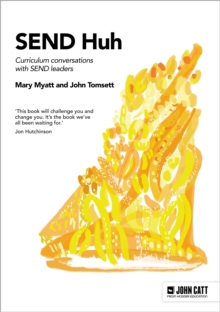
SEND Huh: curriculum conversations with SEND leaders
Myatt, Mary
Paperback / softback
Huh is the Egyptian god of endlessness, creativity, fertility and regeneration. He is the deity Mary Myatt and John Tomsett have adopted as their god of the curriculum. Their Huh series of books focuses on how practitioners design the curriculum for the young people in their schools. The Huh project is founded on conversations with colleagues doing great work across the education sector. In SEND Huh, Mary Myatt and John Tomsett discuss curriculum provision for pupils with additional needs with some of the leading experts in the field. Mary and John interviewed pupils, parents, teachers, headteachers, CEOs, educational consultants and lecturers. They then edited the transcriptions of those interviews to provide an ambitious, thoughtful, nuanced and challenging vision of what the best possible provision looks like for children with additional learning needs. The challenging conversations that comprise SEND Huh paint an inspiring picture that is hugely hopeful for the future of SEND curriculum provision in our schools.
More Details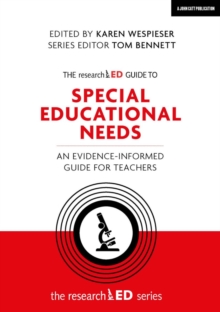
The researchED Guide to Special Educational Needs: An evidence-informed guide for teachers
Wespieser, Karen
Paperback / softback
researchED is an educator-led organisation with the goal of bridging the gap between research and practice. This accessible and punchy series, overseen by founder Tom Bennett, tackles the most important topics in education, with a range of experienced contributors exploring the latest evidence and research and how it can apply in a variety of classroom settings.In this edition, Karen Wespieser examines the latest research surrounding pupils with special educational needs. editing contributions from writers including: Richard Selfridge; Sabrina Hobbs; Gary Jones; Kenny Wheeler; Oliver Caviglioli; Rob Webster; Barney Aglis; and Chris Rossiter.
More Details4. Advance your career
Now that we have discussed all the, somewhat, immediate benefits of CPD, let's cast our thoughts to the future, specifically career advancement. Your career advancement could be an internal promotion or a new job. Regardless, highlighting your CPD qualifications and interests on your CV is key. It shows your employer, or potential employer, that you are not content with standing still in your role but are actively moving forward.
Accredited courses are great; they can be internationally recognized, and you do gain a qualification. If they're not in your budget, there are plenty of books, podcasts, and workshops out there that you can take advantage of. Another way to enhance your career prospects is to develop a specialisation. Establishing yourself as an expert in any field could increase your hireability.
If you’re considering using CPD to advance your career have a look at these books on leadership:

Building Culture: A handbook to harnessing human nature to create strong school teams
Sharma, Lekha
Paperback / softback
Building Culture navigates the complex educational landscape and provides a look at school culture, highlighting key aspects of cultivating culture that leads to great pupil outcomes. Rooted in her own experience as a senior leader, Lekha Sharma knows that leaders need not only the what of curriculum, assessment and pedagogy but also the how. How can school leaders bring together the theoretical knowledge they possess and mobilise it on the ground so that they can have a positive and tangible impact on pupil outcomes? Teachers are increasingly equipped with the awareness and knowledge of cognitive psychology but what other areas of psychology could support those that lead those very teachers? And what elements of human nature can we harness to build the kind of school cultures that are conducive to improving outcomes for pupils? Building Culture provides a great start to answering all those questions.
More Details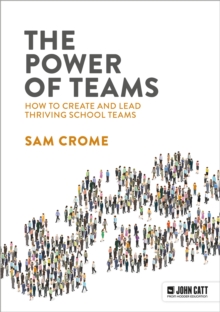
The Power of Teams: How to create and lead thriving school teams
Crome, Samuel
Paperback / softback
In education, resources and time are scarce, yet the demand for performance is sky high. School leaders invest money and labour into improving their schools, navigating trade offs along the way. But what if one of the biggest improvements we could make to our schools was something we already do? What if enhancing teamwork so that school teams thrive, was actually the secret ingredient to success?The Power of Teams explores evidence from across sectors, including education, to find out what high-performing teams share, and how we can adapt the most effective teamwork strategies to the unique environment of a school. The book outlines a model of teamwork factors that contribute to truly thriving teams, with theory, research, tangible actions for school teams, and a range of expert voices who contribute their experience in case studies. Effective teamwork leads to purpose, belonging, trust, learning, and, ultimately, high performance. When we better understand the nuances of how teams can thrive, we discover the real Power of Teams.
More DetailsYou might have started reading this article agreeing with the many who view CPD as a hindrance. Hopefully, now you can see how CPD is a vital tool that you can utilise to enhance your skills as well as those around you.
CPD resources come in a range of forms. The Association of Teachers and Lecturers (ATL) section of the UK National Education Union suggest that CPD can incorporate:
- Training courses and workshops
- Studying for a qualification or accreditation
- Online courses/webinars/podcasts
- Observation and shadowing
- Mentoring
- Peer group exchanges
- Attending exhibitions and conferences
- International exchanges
- Self-reflection, personal reading or research
Founded in 1959, John Catt Educational is a leading independent publisher of high-quality guidebooks, magazines and educator-focused professional development books. They are a part of Hodder Education (a division of Hachette UK), which supports teaching, learning and assessment throughout the world, providing coverage for primary, KS3, GCSE, IGCSE, IB and A level alongside numerous vocational qualifications.
Priya Kudhail from John Catt, September 2023
